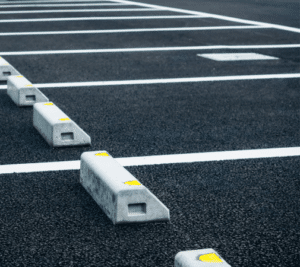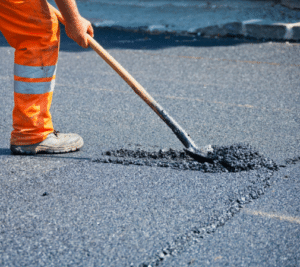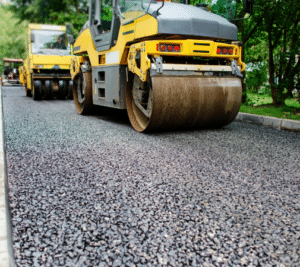Are you considering repaving your driveway? Before you make a decision, it’s essential to understand the differences between chip seal vs asphalt. While both options offer durability and a smooth surface, they have distinct characteristics that may influence your choice. Whether you’re a homeowner or a contractor, this article will provide the information you need to decide between chip seal and asphalt.
Chip Seal Driveways
Chipseal driveways, also known as tar and chip or chip and seal driveways, offer a unique and affordable option for homeowners looking to enhance the curb appeal of their property. This type of driveway involves the application of a layer of hot liquid asphalt to the base layer, followed by a layer of small stones or chips. The result is a rustic and natural-looking surface that adds character to any home.
Pros and Cons of Chip Seal Driveways
Pros of Chip Seal Driveways:
- Cost-effective: Chip seal is generally more affordable than other driveway paving options, such as asphalt or concrete. It can be cost-effective for homeowners looking for a durable and functional driveway without breaking the bank.
- Durable: Chip seal driveways are known for their durability. The combination of hot liquid asphalt and a layer of stone chips creates a strong and resilient surface that can withstand heavy traffic, including cars and trucks. It can handle temperature fluctuations and resist cracking better than other driveway materials.
- Low maintenance: Chip seal driveways require minimal maintenance. The surface is relatively low-maintenance, as the stone chips provide some traction and help prevent the surface from becoming too slippery. Routine maintenance typically involves periodic sweeping and reapplication of a new layer of sealing materials, which can be done every few years.
- Quick installation: Chip seal driveways can be installed relatively quickly compared to other types of driveways. The process involves applying a layer of hot liquid asphalt and immediately spreading stone chips on top. Once it cools and sets, the driveway is ready for use. The quick installation means minimal disruption to your daily routine.
- Aesthetics: Chip seal driveways offer a rustic and textured appearance. The stones used in chip seal can vary in color and size, allowing you to choose a style that complements your home and landscape. It can add a unique and visually appealing element to your property.
- Slip resistance: The textured surface of a chip seal driveway provides good traction, making it less slippery than smooth surfaces like concrete or asphalt. This can be particularly beneficial during wet or icy conditions, reducing the risk of slips and falls.
- Energy-efficient: The light-colored stones used in chip seal reflect sunlight, reducing heat absorption. This can help keep the driveway and the surrounding area cooler, especially in hot climates. Consequently, it can contribute to energy efficiency by reducing the heat island effect around your property.
Cons of Chip Seal Driveways
- Rough surface: Chip seal driveways have a textured surface due to the stone chips embedded in the asphalt. While some people find this appearance appealing, others may prefer a smoother, more uniform surface that materials like asphalt or concrete provide. The roughness may be less comfortable to walk on, especially on bare feet or with certain types of footwear.
- Initial odor and mess: During installation, hot liquid asphalt can release strong odors, which some people find unpleasant. Additionally, the initial application and settling of stone chips can lead to loose stones on the surface, causing a temporary mess until the driveway stabilizes.
- Loose stones and gravel migration: During the first few weeks or months after installation, loose rocks and gravel may become dislodged and migrate to other areas, such as lawns or sidewalks. This migration can be a nuisance and may require periodic sweeping to keep the driveway neat and prevent stones from accumulating in unwanted areas.
- Limited color options: While chip seal driveways offer a rustic and natural look, the color options are somewhat limited compared to other materials. The stones used in the chip seal process come in natural colors, and you might not find as wide a range of color choices as you would with concrete or pavers.
- Maintenance requirements: While chip seal driveways generally require less maintenance than other options, they are not maintenance-free. Over time, the surface may wear down, and you’ll need to periodically apply a fresh layer of sealing materials. Neglecting maintenance can result in a worn-out appearance and decreased durability.
- Initial curing time: Chip seal driveways need time to cure and set properly. During this initial curing period, it’s essential to avoid heavy traffic, which can damage the new surface. This limitation can inconvenience households with multiple vehicles or high traffic volumes.
- Limited lifespan compared to some alternatives: While chip seal driveways are relatively durable, they may not have the same longevity as asphalt or concrete driveways. Proper maintenance can extend their lifespan, but eventually, you may need to resurface or repair the driveway.
Asphalt Driveways
Asphalt driveways have long been popular among homeowners for their durability and smooth surface. Installing an asphalt driveway involves creating a solid base layer and then applying layers of liquid asphalt to create a strong and stable surface. This type of driveway is known for its ability to withstand heavy vehicles and regular use without showing signs of wear and tear.
Pros and Cons of Asphalt Driveways
Asphalt driveways have become popular among homeowners due to their numerous advantages. However, like any other option, they also have pros and cons that must be considered before making a decision. Let’s look at the advantages and disadvantages of asphalt driveways.
Pros Of Asphalt Driveways:
1. Durability: One of the most significant advantages of asphalt driveways is their durability. They are designed to withstand heavy traffic and the weight of vehicles without showing signs of considerable wear and tear. This makes them an excellent option for households with multiple cars or those residing in areas with heavy vehicles passing through.
2. Easy Maintenance: Asphalt driveways require minimal maintenance compared to other options. Regular sealing is recommended to protect the surface from UV rays and heavy rains, but professionals can easily do this. The smooth surface of asphalt driveways makes them easy to clean, usually requiring only regular sweeping or occasional power washing to keep them looking well-maintained.
3. Longevity: An asphalt driveway can have a long lifespan when properly installed and maintained. They can last for decades if taken care of properly. This provides homeowners with peace of mind and saves them money in the long run, as less frequent repairs and replacements are needed compared to other driveway materials.
Cons Of Asphalt Driveways:
1. Initial Cost: One of the main concerns with asphalt driveways is the higher upfront cost compared to other options. The price can vary depending on factors such as size and location, making it essential for homeowners to consider their budget. However, the longevity and minimal maintenance often make the investment worth it in the long run.
2. Vulnerability to Stains: Asphalt driveways are susceptible to oil and chemical stains. These substances can penetrate the surface and cause discoloration or damage if not cleaned promptly. Homeowners must be diligent in cleaning up spills to maintain the integrity and appearance of their asphalt driveway.
3. Limited Design Options: While asphalt driveways come in various colors, the design options may be somewhat limited compared to other materials, such as concrete. This can be a drawback for homeowners looking for a more unique or customized look for their driveway.
In conclusion, asphalt driveways offer many advantages, including durability, easy maintenance, and longevity. However, they have a higher upfront cost, vulnerability to stains, and limited design options compared to other options. Homeowners must weigh these pros and cons and consider their specific needs and preferences before deciding.
Chip Seal Vs Asphalt – What Should You Choose?
In conclusion, whether you choose chip seal or asphalt for your paving needs, it’s important to weigh the pros and cons and consider your specific situation. Both options have their advantages and disadvantages, but ultimately, it comes down to personal preference and budget. Whichever you choose, remember that a well-maintained driveway or road can enhance the overall aesthetic appeal and functionality of your property. So, make an informed decision and happy paving!
If you have questions regarding which type of driveway would work best for you, give us a call at Saguaro Asphalt! Our knowledgable team can answer any question you might have.



